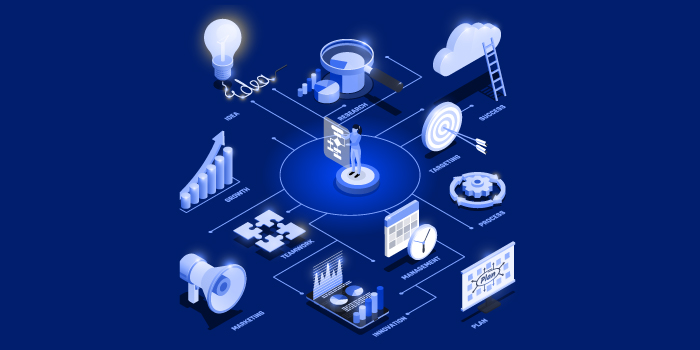If you scour the internet there are millions of resources from videos, books, podcasts, social media posts, blogs, webinars and more just devoted to customer acquisition.
How to sell better, how to increase sales, how to get more customers faster are all popular tropes.
While perfecting your sales strategy is crucial to business success, what comes after?
You need to get these customers to stay with you long term. The best way to do that is to engage with them and build consistent and mutually beneficial relationships.
In fact, it is believed that successfully engaged customers contributed more to the share of wallet than regular customers.
By using customer engagement platforms, your business can interact with customers across multiple channels, such as social media, email, and messaging apps, providing a seamless and personalized experience.
In this blog, we will explore how you can use customer engagement software for your business, the features you should look for while buying new software and some recommendations to help you make an informed decision.
What is customer engagement software?
Simply put, customer engagement software is a technology that allows businesses to better understand their customer’s needs at every stage of the buying cycle.
You need to identify where they are in the buyer journey, the objections and hurdles they face.
You can then tailor your messaging and offerings in a relevant manner, thereby, providing them with a smooth and consistent experience with your business.
Customer engagement platforms typically leverage the features of CRM, marketing automation, analytics, and messaging tools. Gone are the days when simply adding their name to an email or message would delight a customer.
Today, there is a need for more personalization, and customer engagement platforms can help you do that.
With good customer engagement software, you can:
- Send appropriate prompts based on product usage for increased customer adoption
- Remind them of upcoming events like new tech conferences, or a trade show in their industry
- Send them notifications for upcoming renewals
- Send them discounts or coupons for an upgrade based on their product usage
It is essential to be where the customers are. More than 60% of customers interact through multiple channels, and they expect consistency irrespective of time, place, and device. By leveraging the insights you gain from a CEP, you can walk the talk, and meet customers where they are.
Benefits of implementing a customer engagement platform
A customer engagement platform provides businesses with a single pane of glass dashboard through which you can monitor customer interactions, their needs and build workflows to nurture the relationship.
Buyers can engage with you either through offline or digital channels. In fact, 80% of customers say they are more likely to do business with a company if they offer a personalized experience, and you can deliver this only through profound insights into customer behavior.
A good customer engagement platform can help you:
1. Improve customer satisfaction:
By helping you speak the same language repeatedly across channels, a customer engagement platform can help you increase customer satisfaction levels.
Customers feel valued when companies take the time to understand their needs and preferences, and 86% buyers have stated that they are willing to pay more for great customer experience.
2. Increase customer loyalty:
When customers have positive experiences with a business, they are more likely to stay with you.
A customer engagement platform enables companies to maintain regular communication to solve their queries and guide them, which can increase customer loyalty.
3. Generate higher revenue:
A customer engagement platform can ultimately lead to higher income by improving customer satisfaction and loyalty.
Happy customers are more likely to make repeat purchases, refer others, and leave positive reviews, which can drive revenue growth.
4. Streamline communication:
These platforms allow businesses to communicate with customers across multiple channels, such as social media, email, chatbots, and messaging apps.
This streamlines communication and makes it easier for businesses to respond to customer inquiries, concerns, and feedback.
5. Enhance data analysis:
Customer engagement software provides businesses valuable insights into customer behavior and preferences.
By analyzing this data, businesses can make more informed decisions about their marketing, sales, and customer service strategies.
Customer engagement platforms vs. CRMs
In its simplest form, a CRM will give you a database of customer names and their activity. However, to personalize their buyer journey and enable you to interact with them along the way, you need the help of a Customer Engagement Platform.
Here are some ways in which a customer engagement platform differs from a basic CRM
| Feature | Customer Engagement Platforms | CRM Systems |
| Channels | Multiple (social media, email, etc.) | Typically limited to email |
| Focus | Customer engagement and retention | Customer management |
| Communication | Two-way communication across channels | One-way communication |
| Personalization | Highly personalized customer journeys | Limited personalization |
| Marketing automation | Included | May or may not be included |
| Sales pipeline management | Typically not included | Included |
| Analytics and reporting | Detailed insights into customer behavior patterns | May or may not be included |
Although some CRM systems may include marketing automation, analytics, and reporting features, these are typically more robust in customer engagement platforms.
Features to Look for in a Customer Engagement Platform
Here’s a checklist you can use to gauge the effectiveness of your software of choice before buying it.
1. Multichannel communication:
To reach customers where they are, you should be able to send messages across channels like email, chat, text messages, social media, etc., to provide a smooth experience.
2. Customer data management:
You should have access to a centralized location for businesses to store and manage customer data, including contact information, purchase history, and preferences.
You should also be able to segment this data by demographics, geography, product adoption, and other criteria to gain more insights into your target personas.
3. Marketing automation:
You should be able to automate repetitive marketing tasks, such as sending welcome emails or abandoned application reminders, to save time and increase efficiency.
4. Personalization:
To provide a delightful experience to the customers, a CEP should provide personalized experiences to customers, such as custom recommendations and messaging based on their behavior and preferences.
5. Analytics and reporting:
You should get detailed insights into customer behavior, such as engagement rates, customer satisfaction, and purchase patterns, allowing businesses to make data-driven decisions.
6. Integration with other tools:
You should be able to integrate with other software, such as social media management tools, chatbots, ticketing software, and customer support software, to create a connected and centralized platform for customer interaction.
Top 6 customer engagement platforms you should consider in 2023:
We’ve chosen the top-rated customer engagement tools with a proven track record of delivering highly personalized journeys to customers at the right place and time.
Businesses have used them across multiple verticals, including education, retail, real estate, and financial services. We’ve included public ratings, pros and cons, and reviews to help you choose better.
1. LeadSquared
LeadSquared is the new-age SaaS platform that provides all-in-one customer engagement capabilities, including sales CRM, marketing automation, and onboarding automation solutions.
It integrates all customer relationship management processes into one system to provide a centralized dashboard for all customer interactions.
With LeadSquared, you can:
- Reduce lead leakages and customer acquisition costs.
- Understand customer intent with 360-degree user profiles, behavior, and social tracking to build personalized buyer journeys.
- Visualize customer and communications journeys with a robust workflow builder.
- Communicate effectively with customers on their channels of choice – text, WhatsApp, email, call, self-serve portals, social media, and more.
- Integrate with your favorite sales and marketing platforms through APIs or native connectors.
Pros:
- Intuitive product that can be used with minimal training
- Specializes in solving customer engagement challenges for high lead volume and high velocity businesses
- Range of customer engagement features such as email marketing, analytics, lead generation, lead management, and more
- Comes with automation features that can simplify the customer journey
- Integrates with a variety of third party tools and applications
Cons:
- Marketing automation can be a little limited
- Pricing can be expensive for a few businesses
G2 rating: 4.6/5
Most promising review:
Using the advanced filters that LeadSquared has, accessing client information and their behaviors is really simple. Real-time monitoring also makes things more alluring.
Also, their quick filters are amazing. Managing leads and customers are pretty simple, including lead stages, activity adding, and task management.
You can also track down daily information regarding your work. It’s effortless to integrate this CRM with IVR tools.
2. Glassix
Glassix is a top-rated, AI-powered customer engagement and messaging platform that combines state-of-the-art solutions for customer support, marketing, and sales teams to stay on top of their game and help them get closer to revenue.
With its omnichannel support features, backed by a powerful AI-driven unified inbox that consolidates all communication channels into one centralized hub, Glassix also offers an easy-to-use, drag-and-drop generative AI chatbot builder and live chat features to help your business stay available through all channels simultaneously.
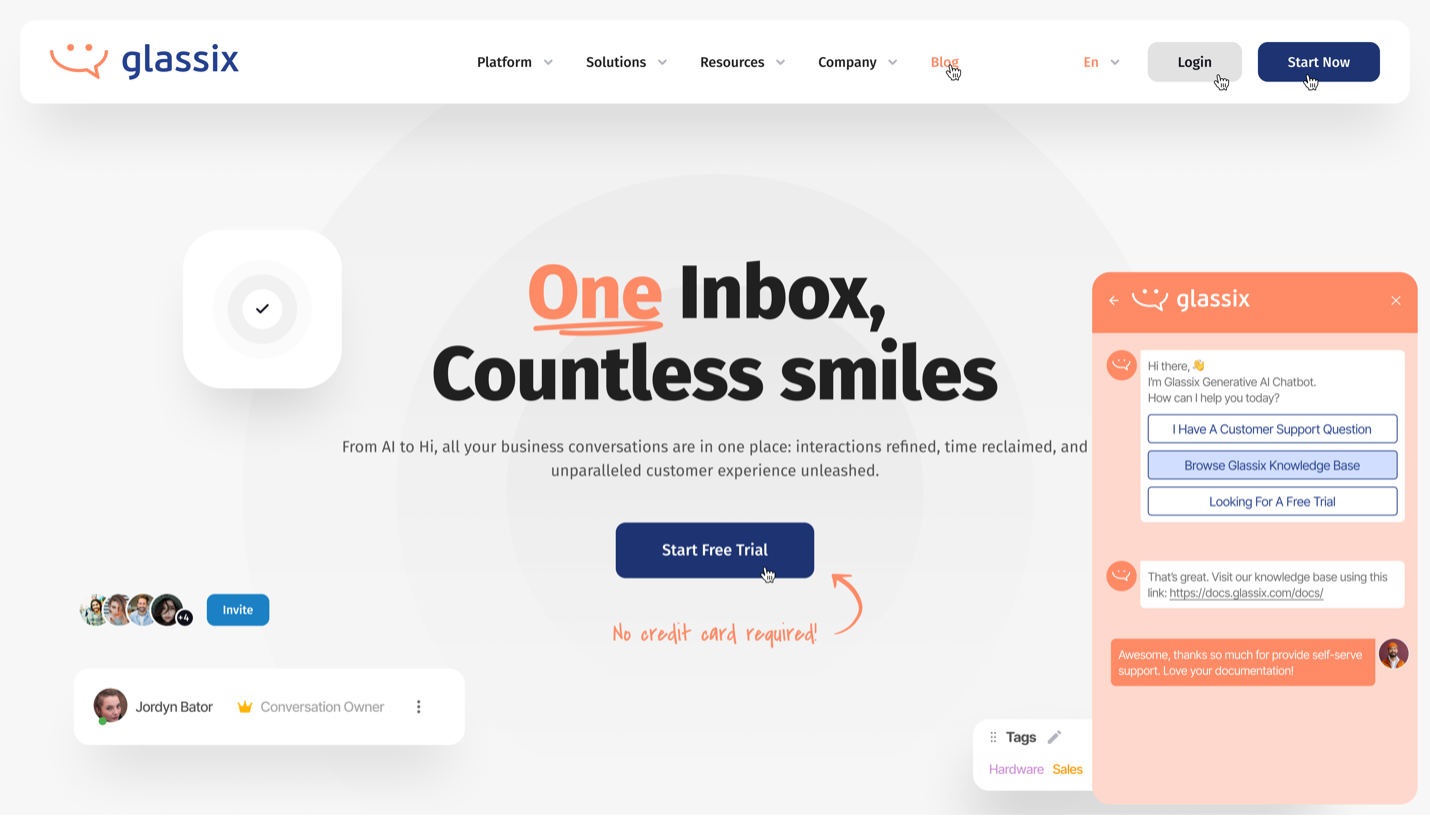
Using Glassix, businesses see a surge in conversion rates, customer satisfaction, and returning customer rates. Glassix helps support teams to converse better, sales teams to convert better, and marketing teams to get deeper insights on their website and or app visitors using its advanced real-time dashboard.
Pros:
- Best pricing and subscription plans for small businesses and startups
- Easy to use, no-code AI chatbot builder
- Real-time dashboard and automated reporting system
- Omnichannel support features
Cons:
- Limited documentation and guides
- Not all languages are supported
- Automation workflow setup can be tedious
- No one-click integration options
G2 rating: 4.8/5
Most promising review:
Glassix is a total lifesaver for our team! What really knocks it out of the park is how simple it is to use. Everything is right where you need it, and the AI is like having a smart assistant that suggests the right answers to customer questions. It’s like night and day compared to our old system – now, we can handle chats, emails, and social media messages all in one place. Plus, the real-time analytics are super handy for keeping an eye on how we’re doing and where we can get better.
3. HubSpot
HubSpot is a popular customer engagement platform offering a wide range of marketing, sales, and customer service tools.
It provides businesses with multichannel communication, marketing automation, personalization, analytics, and reporting and integrates with other agencies for social media management, customer support, and more.
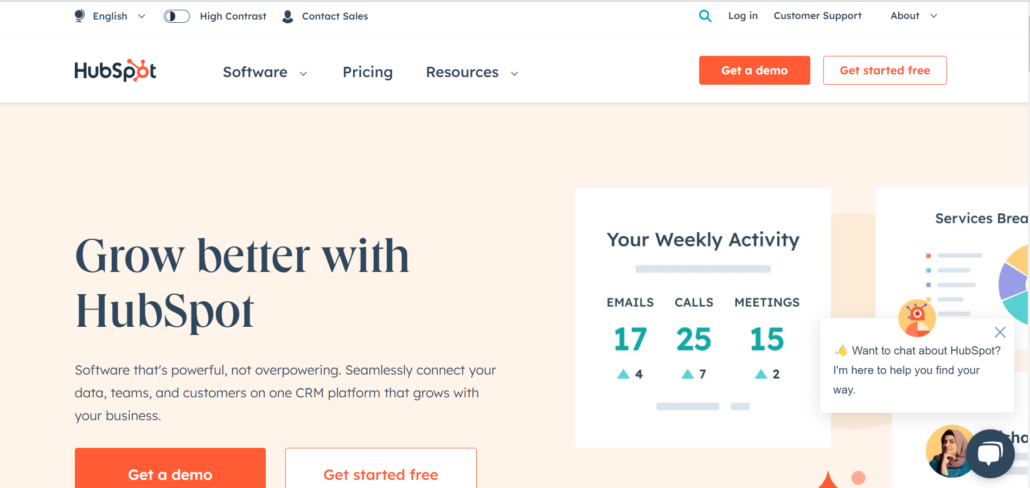
With this tool, businesses can get richer insights, warmer leads, and aligned enablement materials to help them operate at max efficiency. Also, they can tap into their expansive ecosystem of app and solutions partners to craft an exceptional end-to-end customer experience.
Pros:
- Comes with a user friendly interface
- An all-in-one tool for businesses
- Offers visibility into sales pipeline
- Combines marketing, sales and service Hubs
Cons:
- Can be expensive
- Inflexible contracts
- Templates are hard to modify
- Limited reporting
- Some features are outdated and problematic
G2 rating: 4.4/5
Most promising review:
HubSpot Sales Hub is a great and powerful tool that gives you all the information about the prospect, that includes social media links, previous organization, etc.
It has features of capturing all the data so that I have all the info in one place and anyone in my team can access it without hesitation.
4. Zendesk
SupportSuite by Zendesk provides customer support across channels. It is sophisticated enough to meet complex needs and simple enough so you can get it up and running quickly.
Businesses can converse with customers on any medium (email, chat, voice, and even social messaging apps like Facebook, WhatsApp, Apple Business Chat, and more) while keeping all the interactions relevant and in one place.
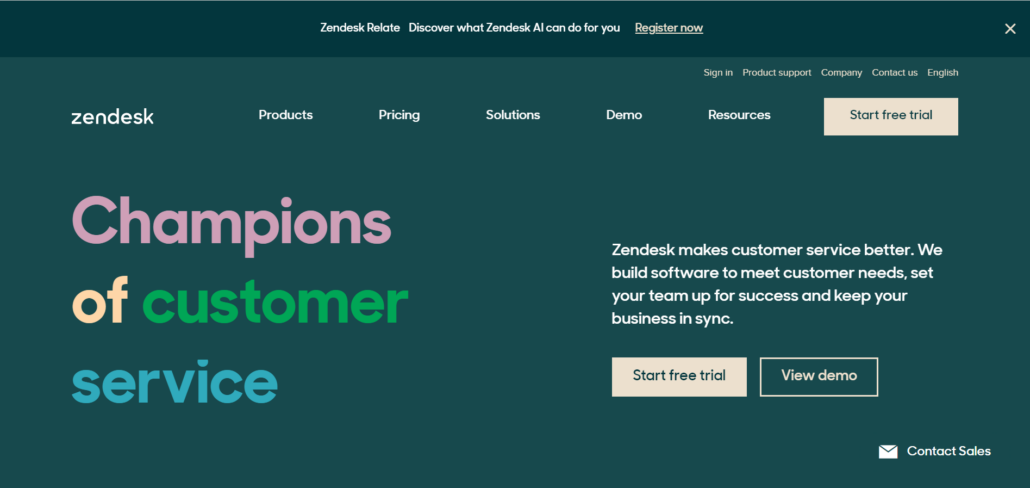
It’s a unified agent workspace — helping teams provide customers with a faster, more personal experience.
Pros:
- Offers a range of products for customer communication
- One of the best live chat solutions in the market
- Allows tracking tickets and customer complaints in real-time
Cons:
- Pricing can be expensive for smaller businesses
- Users have reported issues with the platforms analytics features
- Interface can be complex and overwhelming for new users
G2 rating: 4.35
Most promising review:
Zendesk provides everything in one place, which is very useful. It helps organizations to bring up all channels quickly: Knowledge Base, Community, Support Email, Web, Chat, and phone. It supports a lot of integrations and customizations.
5. Intercom
Intercom creates modern customer service software that redefines how businesses support their customers. Their platform connects businesses directly to customers using powerful messaging and automation. They enable teams to scale support without investing more resources – leading to happier customers and more efficient support teams.
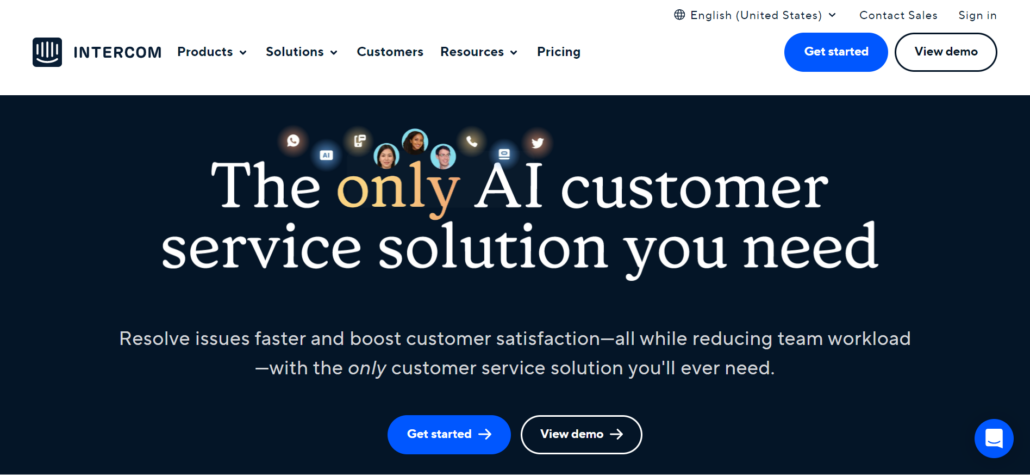
Pros:
- Powerful messaging and automation platform
- Allows monitoring of customer behavior
- Easy to use and comes with a range of integrations
Cons:
- Limited reporting and analytics capabilities
- Automation features can be complex and might require expert assistance
- Not the best fit for businesses with complicated engagement requirements
G2 rating: 4.4/5
Most promising review:
Intercom’s software is designed with the end-user in mind. Creating a knowledge base and populating it with attractive, easy-to-read support articles is simple. But this simplicity belies the power of Intercom’s toolkit, which has robust editing, organizing, indexing, and reporting functionalities.
6. Sprout Social
Sprout Social is a social media management and engagement platform that provides businesses with social listening, scheduling, and reporting tools.
It offers multichannel communication, analytics, and reporting and integrates with other tools for customer support and marketing automation.
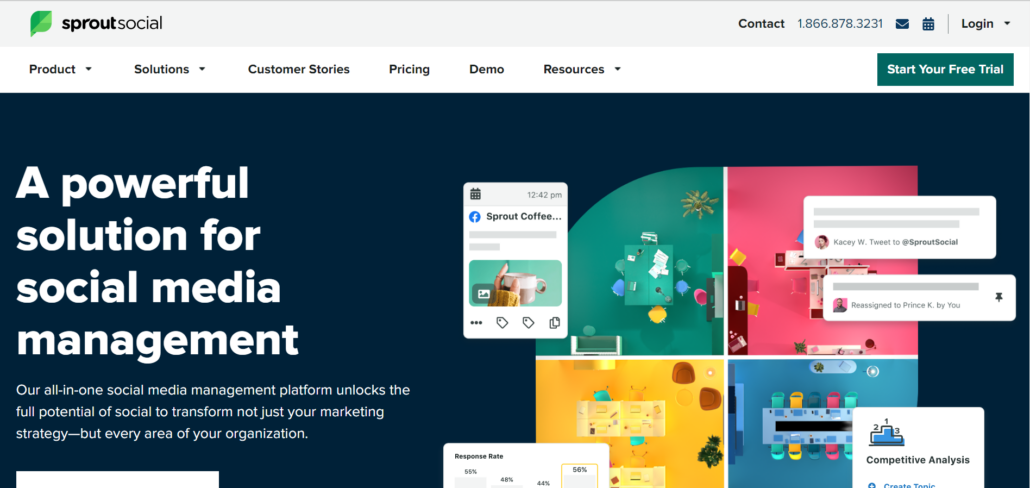
Pros:
- Offers customer tracking features like social listening, content scheduling and more
- Easy to use for any kind of business
- Comes with employee advocacy to amplify reach
Cons:
- The mobile app can be slow and clunky
- Reporting features can be improved
- Can get expensive for small businesses
G2 rating: 4.4 /5
Most promising review:
Sprout is helpful for community management, scheduling posts, and analyzing social data. What I like the most is that they continuously update the platform as social media channels evolve.
It’s really user-friendly while still having a good amount of organizational flexibility. Sprout reps are always super helpful and knowledgeable, and they’ve got many resources to learn and improve our social strategy.
Conclusion
Customer engagement platforms are essential for businesses building and maintaining strong customer relationships. This could be through multiple channels like social media, email, text, call or chat.
A customer engagement platform helps you do this effectively with multichannel communication, personalization, marketing automation, analytics and reporting, and integration with other tools
At the same time, with so many customer engagement platforms available, it can be challenging to choose the right one for your business.
You may give LeadSquared a try. It is a comprehensive customer engagement platform that with which businesses can streamline their marketing, sales, and customer service processes, providing customers with a seamless and personalized experience at every touchpoint.
If you’re looking for a powerful and intuitive customer engagement platform to help you engage with your customers, get in touch with our team today.





